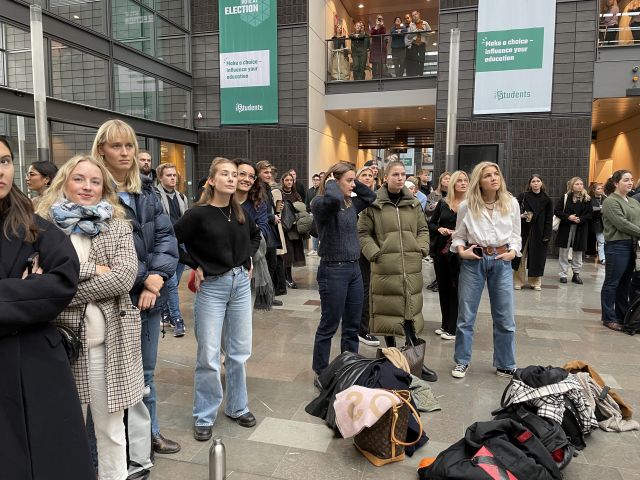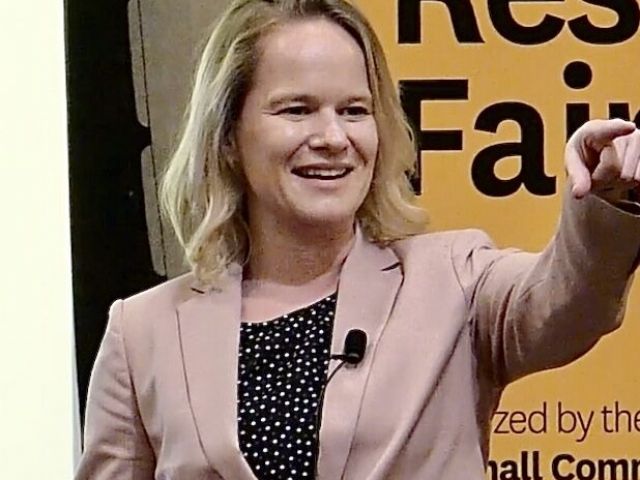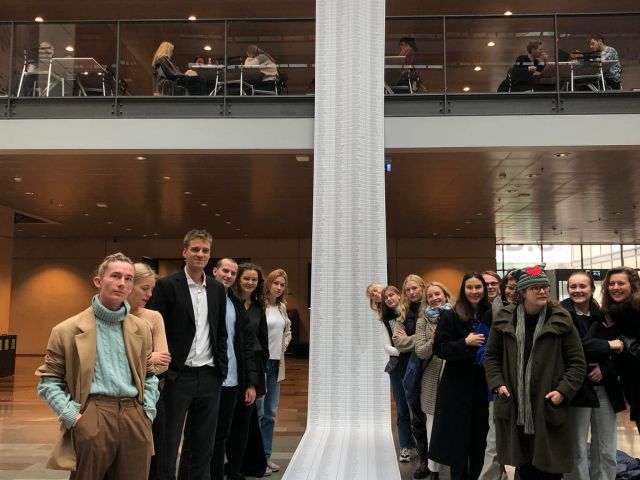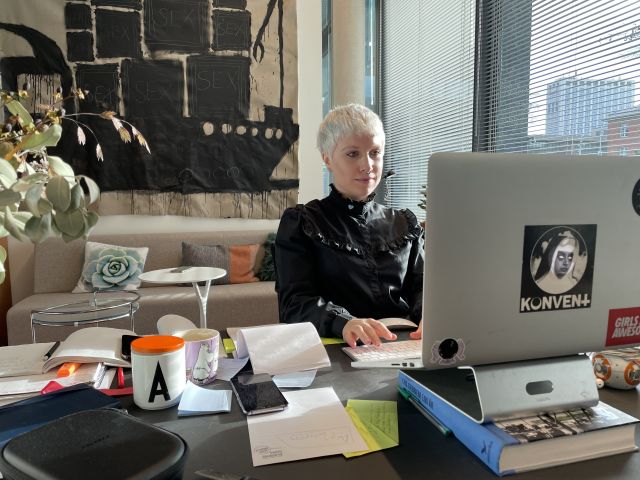(This is an open letter written by The Student Rebellion at CBS directed to the CBS Board of Directors.)
We are writing to you because we, the Student Rebellion at CBS, have discovered crucial examples and evidence that shows fundamental doubt concerning the ‘objective criteria’ set up by the CBS management to accommodate the relocation plan (see appendix 1: CBS’ study programmes in relation to data for selected criteria). Specifically, this relates to 1) Data-processing errors regarding the BSc in Business Administration and Philosophy (HA.(fil.)), 2) Gender discriminatory unemployment rates in relation to maternity leave, which applies particularly to studied with a predominance of women, as exemplified by the MSc in Social Sciences in Political Communication and Management (Cand.Soc i Politisk Kommunikation og Ledelse) 3) Job creation versus job occupation, particularly in relation to the programmes MSc Soc – Organisation Innovation & Entrepreneurship and MSc Soc – Management of Creative Business Processes
As the Student Rebellion at CBS, we feel obliged to point out that these discoveries have undermined our trust in the plan presented by the management, and we question that its foundation is accurate. We believe the Board of Directors should also have the following grounds for doubt.
1. Data-processing errors
On the BSc in Business Administration and Philosophy (HA.(fil.)) (see appendix 2: Initial insights into PHIL employment using administrative registers from Statistics Denmark), the bachelor’s degree has an unemployment rate below the CBS average when students who continue directly to study for an MSc in Business Administration & Philosophy are deducted from the calculation.
The management has not adjusted the figures to take this into account when processing the unemployment rates. This error is appalling. Particularly since the management explained on 23 November: “We have needed to collect data, and yes, that has taken longer than we had counted on, but we want to be sure about whether we had overlooked anything.”
As this relates to an in-house report at CBS, there should be no excuse for the management’s own error that it has not managed to collect or apply the required knowledge to further qualify and inform the proposal in time.
2. Gender-discriminatory unemployment rates in relation to maternity leave
Most of the involved studies have small intakes of students and are also significantly predominant in women. Hence, when dealing with statistics in small populations, one should be conscious in relation to the representivity of the data and its statistical uncertainty. However, we have found a specific example that shows how discrimination against women occurs when the unemployment rates are calculated.(see appendix 3: Correspondence with the Ministry of Higher Education and Science, 24 November 2021).
Example: One person on the MSc in Social Sciences in Political Communication and Management graduated on 7 June 2019. She began her maternity leave three weeks later as her due date was in mid-July. This person was on maternity leave until June 2020 and subsequently landed a job in December 2020.
07 June 2019: Graduate
28 June 2019: Maternity leave begins
June 2020: Maternity leave ends and she joins the labour market
December 2020: Job start
As shown in the appendix, we have been notified by the Ministry of Higher Education and Science that this woman’s unemployment between June 2020 and December 2020 counts towards the unemployment rate from 2019 for the MSc in Social Sciences in Political Communication and Management. In other words, this one woman who had been on maternity leave puts the MSc in Social Sciences in Political Communication and Management in the red zone and therefore falls under the CBS definition of structural unemployment. What is worth noticing is that, unlike other graduates, this woman has been unable to apply for jobs until the fourth–seventh quarters due to maternity leave, and yet her unemployment is included in the unemployment rates for the period fourth–seventh quarters.
This is by no means a unique problem. It is problematic because when the management chooses these unemployment rates as a crucial proxy, it is also choosing a proxy with an inherent bias against persons taking maternity leave. And worse a proxy with an inherent bias specifically against an education that attracts more women – a bias that could be reinforced in study programs with a predominance of women and with low intakes in population.
Further, we find it extremely problematic that when asked by us students Søren Hvidkjær told us at the hearing on Tuesday the 23rd that women’s maternity leave does not affect the unemployment number.
The fact that the management has at no point considered that its ‘objective criteria’ have a gender-discriminatory bias is appalling. Not only because diversity is an element of the CBS values, but also because a world where equality prevails is what we all aspire to achieve.
3. Job creation versus job occupation
The management’s proposal also includes the MSc Soc – Organisational Innovation & Entrepreneurship. Considering this education in particular (see appendix 4: Organisational Innovation & Entrepreneurship – a strategic asset for CBS), it is clear that these studies relate directly to entrepreneurship, and that out of 142 alumni, 84 new jobs have been created.
It is crucial to note that these studies are for students who later establish start-ups and the fact that many start-ups fail should be taken into account. It is therefore a natural consequence of such studies that some students will not be successful during their first year in the labour market. In other words, the management’s ‘objective criteria’ are in no way fair on students who are directly training to become entrepreneurs. In addition, creative businesses – from e.g. the MSc Soc – Creative Business Processes – are dominated by project employment, which naturally involves unemployment. Consequently, the management is letting the hammer fall hardest on students who are willing to take the highest risk in relation to stable working conditions and monetary rewards.
It is appalling that the management has not taken job creation into account in its decision-making process. As CBS actively encourages some graduates to start companies, it makes no sense at all to then punish these study programs based on their unemployment rates.
It is equally appalling that the management’s decision-making basis has failed to consider the intentions behind the study programs. As students, it is hard to have trust in a management that demonstrates through its plans that it has no idea which study programs it is dealing with.
We no longer have trust in the management, and can no longer imagine that you, as the Board of Directors, can have trust in the management
As the three examples above underline, it should be universally clear that:
- The management has made processing errors in the unemployment rates.
- The management has failed to question what the unemployment rates represent.
- The management has failed to look beyond the unemployment rates to consider what can be created.
- The management has not considered the intentions underlying the unemployment rates.
The management’s uncritical approach to its ‘objective criteria’ cannot, therefore, justify the selection of the study programs facing potential[HD7] closure.
It is our clear opinion that the evidence presented here undermines any trust in the management executing the relocation plan in an appropriate manner.
This letter is a precise example of the vital role played by critical thinking, also when processing figures. The management has spent over four months preparing a plan containing basic errors and omissions that we have found in the space of just a few days. Our fear is: What would we find if we had more time? We are dealing here with inexcusable problems since the management has chosen to operate with ‘objective criteria’ without considering their inherent reality and arbitrariness.
We urge the Board of Directors in the strongest possible terms to reject the management’s plan, as the basis for the decisions made contains too many grave errors and omissions, and we cannot have trust in the fundamental premises on which the closure plan is based.
Instead, we urge that new criteria should be used to solve the task – criteria that are visionary in their outlook and include an ambition describing CBS and the world in the future.
Yours truly,
The Student Rebellion at CBS
Andreas Dahl Jakobsen, Ian Felix Dejean, Laura Friis Tørsleff, Morten Levinsen, Oliver Anton, Mads Thaarup, Elizabeth Bruun, Pernille Dyrby, Laura Möller
(see appendixes here: Bilag-1-CBS-uddannelser-i-forhold-til-data-for-udvalgte-kriterier, Bilag-2-Initial-insights-into-PHIL-employment-using-administrative-registers-from-Statistics-Denmark-DSTBilag-3-Korrespondance-med-Uddannelse-og-forskningsministeriet-24.-november-2021Bilag-4-Organisational-Innovation-Entrepreneurship-a-strategic-asset-for-CBS )



































































































































It’s starting to look like a management under a huge pressure…